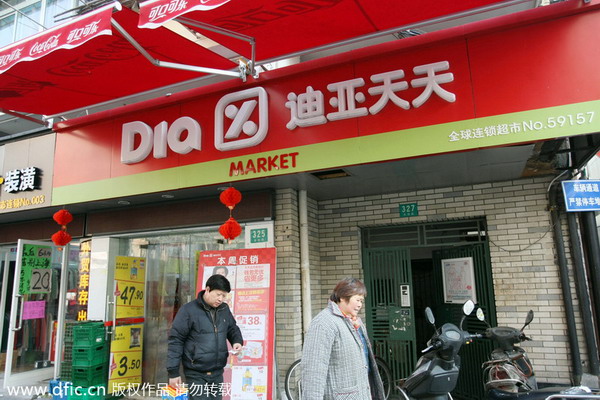 |
|
A convenience store is pictured in Shanghai, Jan 14, 2014. [Photo / IC] |
Outlets become smaller as costs rise and more customers head online
Small is the new beautiful when it comes to China's retail industry, according to industry experts.
French Carrefour SA, for instance, the world's second-largest retailer by revenue, recently opened its first convenience store in Shanghai after two decades in the country, in a sign that traditional hypermarkets are gradually shifting to smaller-sized stores to offset the high costs of physical stores and fast growth in online shopping.
Convenience stores close to residential areas, particularly, have been gaining market share.
Last weekend, Carrefour launched its first "Easy Carrefour" branded store in the Minhang district of Shanghai, according to a source at the French retailer.
Germany's retailer Metro AG is also due to expand its new convenience format, which can be bought as a franchise too, according to a report by China Chain Store magazine.
Its format is quite specifically targeted at areas, it said, near schools, residential communities and hospitals, covering floor space ranging from 50 to 100 square meters.
Wang Hongtao, director of communications at the China Chain Store & Franchise Association, said traditional retailers including department stores and hypermarkets have been recording slower growth because of the impact of the slowing economy, the government's anti-corruption policies and the emergence of e-commerce.
But convenience stores have been immune to those factors, said Wang, who is also general director of the convenience store committee.
The association has just released its China Urban Convenience Stores Index, which shows the average saturation level of convenience stores on the Chinese mainland is one for every 5,000 people, compared with Japan and Taiwan where there is one for every 2,000 residents.
The city of Dongguan, in Guangdong province, has the highest level with one store for 2,667 people.
The index also shows operating hours of convenience stores in China are low with only about half staying open 24 hours a day, many of which are in southern and coastal areas.
The study said the convenience store sector is now considered to be the fastest-growing section of the retail industry with a growth rate of 19.5 percent on average in 2013, among the surveyed 26 cities, significantly higher than that of department stores and hypermarkets.
Ben Cavender, principal at the China Market Research Group, said one of main reasons retailers are now opening more convenience stores is the cost of real estate.
Smaller format stores can focus on high-margin products and also serve consumers who might not be able to visit a hypermarket, he said.
Their challenge, however, is that there is a high degree of competition in the market so the stores really have to focus on strong product offerings and good service to attract customers, said Cavender.
Spanish community retailer Dia Tiantian recently quit the Beijing market to focus on Shanghai where it has 361 stores, because it said revenues from the stores were half of what they are in Shanghai.
